|
Books Should Be Free Loyal Books Free Public Domain Audiobooks & eBook Downloads |
|
|
Books Should Be Free Loyal Books Free Public Domain Audiobooks & eBook Downloads |
|
Top Authors |
|---|
|
Book type:
Sort by:
|
By: Oscar Wilde (1854-1900) | |
|---|---|
 The Soul of Man
The Soul of Man
“(T)he past is what man should not have been. The present is what man ought not to be. The future is what artists are.”Published originally as “The Soul of Man Under Socialism,” this is not so much a work of sober political analysis; rather it can be summed up as a rhapsodic manifesto on behalf of the Individual. Socialism having deployed technology to liberate the whole of humanity from soul-destroying labour, the State obligingly withers away to allow the free development of a joyful, anarchic hedonism... | |
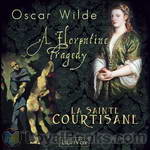 A Florentine Tragedy and La Sainte Courtisane
A Florentine Tragedy and La Sainte Courtisane
Two short fragments: an unfinished and a lost play. A Florentine Tragedy, left in a taxi (not a handbag), is Wilde’s most successful attempt at tragedy – intense and domestic, with surprising depth of characterisation. It was adapted into an opera by the Austrian composer Alexander Zemlinsky in 1917. La Sainte Courtisane, or The Woman Covered in Jewels explores one of Wilde’s great idées fixes: the paradox of religious hedonism, pagan piety. Both plays, Wildean to their core, revel in the profound sadness that is the fruit of the conflict between fidelity and forbidden love... | |
 A Woman of No Importance
A Woman of No Importance
A Woman of No Importance is a play by Irish playwright Oscar Wilde. The play premièred on 19 April 1893 at London's Haymarket Theatre. It is a testimony of Wilde's wit and his brand of dark comedy. It looks in particular at English upper class society and has been reproduced on stages in Europe and North America since his death in 1900. | |
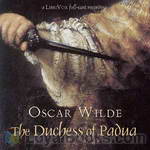 The Duchess of Padua
The Duchess of Padua
Guido Ferranti, a young man, travels to Padua with his friend Ascanio after receiving a mysterious letter from a stranger, claiming to know the true secret of Guido's birth. His plan of revenge goes awry, however, when he falls in love with his enemy's beautiful wife, the Duchess of Padua. | |
 Intentions
Intentions
| |
 Essays and Lectures
Essays and Lectures
| |
 Lord Arthur Savile's Crime and Other Stories
Lord Arthur Savile's Crime and Other Stories
Lord Arthur Savile's Crime and Other Stories is a collection of short semi-comic mystery stories. This collection exemplifies Wilde's sharp wit and dark humour. Stories in this collection include Lord Arthur Savile's Crime, The Canterville Ghost, The Sphinx Without a Secret, The Model Millionaire, and The Portrait Of Mr W H. | |
 Selected Prose of Oscar Wilde
Selected Prose of Oscar Wilde
| |
 Miscellaneous Aphorisms; The Soul of Man
Miscellaneous Aphorisms; The Soul of Man
| |
 Miscellanies
Miscellanies
| |
 Vera; or the Nihilists
Vera; or the Nihilists
Vera; or, The Nihilists is a play by Oscar Wilde. It is a melodramatic tragedy set in Russia and is loosely based on the story of Vera Zasulich. It was the first play that Wilde wrote. It was produced in the United Kingdom in 1880, and in New York in 1882, but it was not a success and folded in both cities. It is nowadays rarely revived. | |
 Shorter Prose Pieces
Shorter Prose Pieces
| |
 For Love of the King a Burmese Masque
For Love of the King a Burmese Masque
| |
 A Critic in Pall Mall Being Extracts from Reviews and Miscellanies
A Critic in Pall Mall Being Extracts from Reviews and Miscellanies
| |
By: Herman Melville (1819-1891) | |
|---|---|
 Moby Dick
Moby Dick
“Call me Ishmael” is one of the most famous opening lines in American literature. With these words, opens one of the strangest and most gripping stories ever written about the sea and sea-faring. Moby Dick by Herman Melville is today considered one of the greatest novels written in America but paradoxically, it was a miserable failure when it first made its debut in 1851. Entitled Moby Dick or The Whale the book finally got its due after the author's death and is now regarded as a classic portrayal of mania and fatal obsession... | |
 Typee
Typee
A whaling ship stops at a remote Polynesian island. The crew aboard is exhausted after a grueling six-month voyage in which they suffered ill-treatment and drudgery. Two men decide to abandon ship and hide on the island, living off the fruit of the land, until they can get on board a more conducive ship. However, to their consternation they discover that part of the island paradise is peopled by a savage and cannibalistic tribe called the Typees. As destiny would have it, they fall into the hands of the very people they dread... | |
 Bartleby, the Scrivener
Bartleby, the Scrivener
Bartleby, the Scrivener: A Story of Wall Street is a novella by the American novelist Herman Melville (1819–1891). It first appeared anonymously in two parts in the November and December 1853 editions of Putnam's Magazine, and was reprinted with minor textual alterations in his The Piazza Tales in 1856. | |
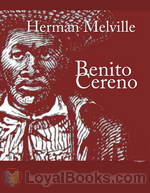 Benito Cereno
Benito Cereno
On an island off the coast of Chile, Captain Amaso Delano, sailing an American sealer, sees the San Dominick, a Spanish slave ship, in obvious distress. Capt. Delano boards the San Dominick, providing needed supplies, and tries to learn from her aloof and disturbed captain, Benito Cereno, the story of how this ship came to be where she is. Dealing with racism, the slave trade, madness, the tension between representation and reality, and featuring at least one unreliable narrator, Melville's novella has both captivated and frustrated critics for decades. | |
 Omoo: A Narrative of Adventures in the South Seas
Omoo: A Narrative of Adventures in the South Seas
Omoo: A Narrative of Adventures in the South Seas is Herman Melville's sequel to Typee, and, as such, was also autobiographical. After leaving Nuku Hiva, the main character ships aboard a whaling vessel which makes its way to Tahiti, after which there is a mutiny and the majority of the crew are imprisoned on Tahiti. The book follows the actions of the narrator as he explores Tahiti and remarks on their customs and way of life.Many sources incorrectly assert that Omoo is based on Melville's stay in the Marquesas. The novel is, in fact, exclusively based on his experiences in the Society Islands. | |
 The Confidence-Man: His Masquerade
The Confidence-Man: His Masquerade
The Confidence-Man: His Masquerade was the last major novel by Herman Melville, the American writer and author of Moby-Dick. Published on April 1, 1857 (presumably the exact day of the novel's setting), The Confidence-Man was Melville's tenth major work in eleven years. The novel portrays a Canterbury Tales-style group of steamboat passengers whose interlocking stories are told as they travel down the Mississippi River toward New Orleans. The novel is written as cultural satire, allegory, and metaphysical treatise, dealing with themes of sincerity, identity, morality, religiosity, economic materialism, irony, and cynicism... | |
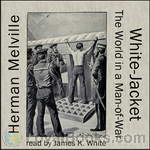 White Jacket, or The World in a Man-of-War
White Jacket, or The World in a Man-of-War
This is a tale based on Melville's experiences aboard the USS United States from 1843 to 1844. It comments on the harsh and brutal realities of service in the US Navy at that time, but beyond this the narrator has created for the reader graphic symbols for class distinction, segregation and slavery aboard this microcosm of the world, the USS Neversink. (Introduction by James K. White) | |
 The Encantadas, Or Enchanted Isles
The Encantadas, Or Enchanted Isles
The Encantadas or Enchanted Isles is a novella by American author Herman Melville. First published in Putnam's Magazine in 1854, it consists of ten philosophical "Sketches" on the Encantadas, or Galápagos Islands. It was collected in The Piazza Tales in 1856. The Encantadas was to become the most critically successful of that collection. All of the stories are replete with symbolism reinforcing the cruelty of life on the Encantadas. (Introduction excerpted from Wikipedia) | |
 Omoo
Omoo
| |
 Battle-Pieces and Aspects of the War
Battle-Pieces and Aspects of the War
| |
 Redburn: His First Voyage
Redburn: His First Voyage
Melville wrote of some of his earliest experiences at sea in the story of Wellingborough Redburn, a wet-behind-the-ears youngster whose head was filled with dreams of foreign travel and adventure. In Redburn, the protagonist enlists for a stint as a seaman aboard Highlander, a merchant ship running between New York and London. As with many of Melville's works, this one is as much about class and race as it is about the sea. | |
 Israel Potter
Israel Potter
| |
 Mardi: and A Voyage Thither
Mardi: and A Voyage Thither
| |
 I and My Chimney
I and My Chimney
| |
 John Marr and Other Poems
John Marr and Other Poems
| |
By: G. K. Chesterton (1874-1936) | |
|---|---|
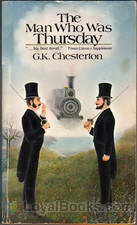 The Man Who was Thursday
The Man Who was Thursday
Two poets in a London park at sunset, debating on the attributes of poetry and whether it's really a metaphor for anarchy. A group that meets in secret, planning to overthrow the world order. Disguises and deceptions, ideals and ideology. A medley of themes and genres makes this a great read for anyone who's a fan of Chesterton and his iconic Father Brown. The Man Who Was Thursday includes Chesterton's favorite theme of Christianity with touches of delightful humor to enliven the twists and turns that abound throughout the book... | |
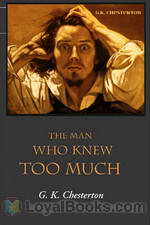 The Man Who Knew Too Much
The Man Who Knew Too Much
Robbery, murder and treason. Strange happenings in quiet English villages. A book critic who happens to find a corpse with its head crushed, an Irish freedom fighter framed for a crime, the disappearance of a valuable coin, a strange dispute over a property claim and a host of other intriguing situations make up the contents of G K Chesterton's collection of short stories The Man Who Knew Too Much. For fans of Chesterton's immortal clerical sleuth, Father Brown, these stories are equally delightful and intricately wrought... | |
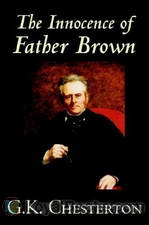 The Innocence of Father Brown
The Innocence of Father Brown
A Chief of Police hosts a dinner party for an American millionaire wishing to will his entire fortune to the Church of France. Jewels that have been stolen and recovered so many times that they're known colloquially by thieves as The Flying Stars. A murder committed by an invisible man. These and many others are the mysteries that are presented to the lovable, bumbling, stumpy Man of God, Father Brown. The Innocence of Father Brown, by G.K. Chesterton is a collection of eleven stories which marks the debut of this most unusual detective... | |